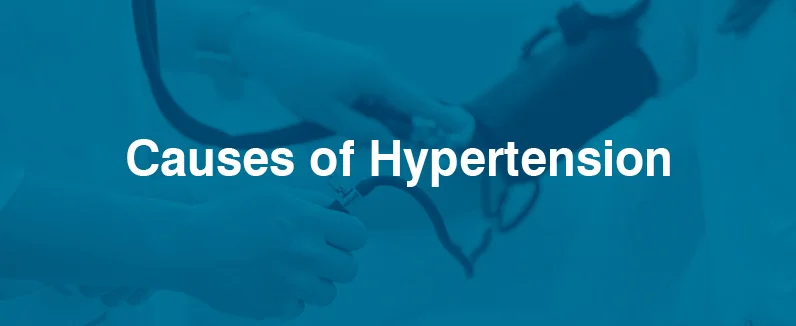Causes of Hypertension
According to Union health ministry preventive health program, around one of every eight people in India have high blood pressure. Hypertension is a very common chronic medical condition, being the underlying cause of around 4 in every 20 conditions affecting the human body. The causes of Hypertension are not very clearly known. However, some potential causes of Hypertension have been identified as recurring patterns over a period of time. These causes are different for the two different types of Hypertension vis-á-vis the following:
- A) Primary Hypertension
Also known as essential Hypertension, Primary Hypertension is a condition that develops over a period of time with no real identifiable cause. Experts believe that most people suffer from this type of Hypertension. There exist a combination of risk factors which may be responsible for this phenomenon. These include the following:
Risk factors:
Unhealthy lifestyle choices such as poor diet, lack of physical activities as well as unhealthy sleeping patterns can take a toll on an individual’s body, over a period of time. These poor lifestyle choices also lead to an increase in the weight and may lead to other related health problems apart from high blood pressure. Obesity is a big risk factor for the development of Hypertension. Alcohol and tobacco use (Smoking) are also risk factors which increase the chances of having hypertension.
Some individuals are at higher risks of developing Hypertension than others. This is because they are genetically more prone to increased blood pressure, owing to genetic abnormalities or mutations inherited from their families.
- B) Secondary Hypertension:
Secondary Hypertension is a more advanced form of Hypertension that occurs more quickly as compared to Primary Hypertension. Secondary Hypertension may be caused due to a variety of factors including the following:
? Owing to side effects of certain medications
? Problems in the adrenal glands
? Obstructive sleep apnea
? Problems in the thyroid gland
? Chronic use of drugs or drug abuse
Seeking immediate and regular treatment and monitoring of Hypertension is vital as it may lead to several medical complications if left untreated over a period of time.
Hypertension and Stroke
Hypertension is a common underlying cause of several types of strokes, being directly responsible for about 57% of all stroke deaths in the country. According to a study, 80% of strokes can be prevented and the best way prevent is to get your blood pressure in the healthy range.
Uncontrolled Hypertension leads to a stroke as it weakens and damages the blood vessels in the brain, causing them to rupture, narrow or leak. This can also lead to the formation of blood clot in the arteries leading to the brain, thereby blocking the flow of the blood to the brain, thus leading to a stroke. Extremely high blood pressure of a 120 mm of Hg or higher diastolic pressure and a 180mm or higher systolic pressure is usually the range of blood pressure that can potentially lead to a stroke.
Strokes that are caused majorly due to Hypertension include the following:
Ischemic stroke: This is the most common type of stroke. An Ischemic stroke is caused by the formation of a blood clot in the artery that supplies blood to the brain. When this clot travels to the brain, it cuts off the supply of oxygen to that particular part of the brain, causing the tissues in that part to die. This is known as an Ischemic stroke.
Hemorrhagic stroke: A rupture in one of the blood vessels supplying blood to the brain can cause blood to leak directly into the brain. This can eventually lead to a buildup of pressure in the brain, leading to a condition known as a Hemorrhagic stroke.

